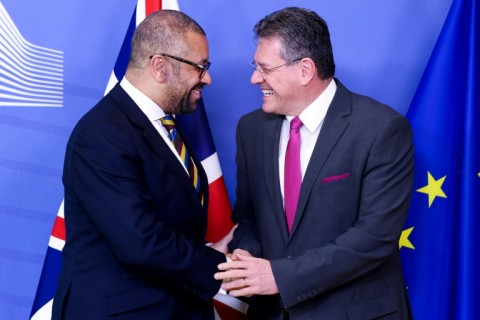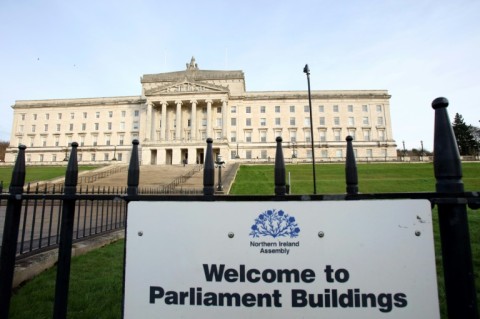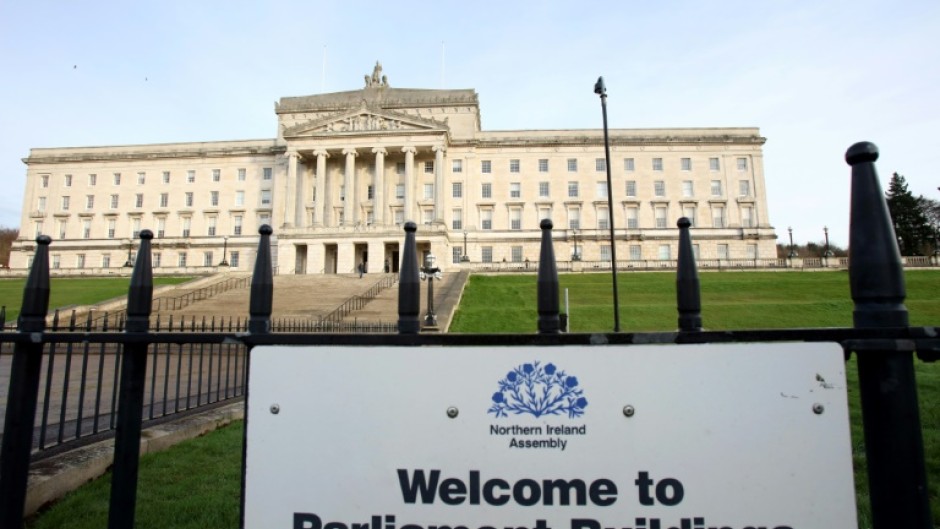
LONDON - The UK and European Union on Friday formally adopted a post-Brexit deal to overhaul Northern Irish trade rules, prompting Brussels' pointman on the thorny issue to proclaim "the opening of a new chapter" in ties.
British foreign minister James Cleverly and EU Commission vice-president Maros Sefcovic signed off the "Windsor Framework" at a joint committee meeting in London, days after UK lawmakers overwhelmingly endorsed a crucial part of the new pact.
It is hoped the agreement, struck after more than a year of negotiations, can reset relations between London and the bloc, which became strained in particular over post-Brexit trade frictions in Northern Ireland.
The pact could also pave the way for power-sharing to resume in the UK province, after it collapsed last year amid opposition from pro-British unionists to the trading arrangements there.
"I see this as the opening of a new chapter," Sefcovic told AFP, shortly after adopting the deal in the British capital, adding that the two sides "are giving new positive momentum to the relationship".
"I think that it will open new avenues in political and economic areas for further cooperation."
- N Irish headaches -
The new framework creates a "green" check-free lane for goods coming from the rest of the UK that are intended to stay in Northern Ireland, without heading into Ireland and the EU's single market.
It will also limit, but not scrap, oversight of the arrangements by the EU's European Court of Justice (ECJ). The deal also hands Northern Irish lawmakers an effective veto over new EU rules being implemented there, through a so-called "Stormont brake".

Northern Ireland remains in the European customs union and single market for goods because of the need to keep an open border with EU member Ireland to the south as part of a 1998 peace deal.
With the rest of the UK out of the EU, that has caused headaches on how to protect the single market on goods heading across the Irish Sea and, unionists claim, made a united Ireland more likely.
Despite the framework's formal adoption, it has so far failed to win the backing of Northern Ireland's largest pro-UK party, the Democratic Unionist Party (DUP).
Its MPs joined 22 hardline Conservative eurosceptics, including ex-leader Boris Johnson, in voting against the "Stormont brake".
But with the support of the main Labour opposition in Westminster, it nonetheless passed easily.
- 'Opportunities' -
DUP leader Jeffrey Donaldson said the framework fails to solve its concerns about Northern Ireland's ability to trade with the rest of the UK.
"That is the bottom line for us," he told MPs on Wednesday. "Until that is resolved, I can't commit to the government that we will restore the political institutions."
Brexit figurehead Johnson called the framework "not acceptable" as he opposed it.
He urged the government to stick with legislation he helped craft that would unilaterally disregard existing EU rules in Northern Ireland until Brussels agreed acceptable alternatives.
But that draft law, introduced last year, prompted the bloc to threaten reprisals and a damaging wider trade war, further souring relations.
The Windsor deal comes just weeks before the 25th anniversary of the Good Friday peace accords which largely ended three decades of conflict in Northern Ireland.
"We believe that with this new framework in place, we are opening new opportunities for the people and businesses in Northern Ireland," Sefcovic said Friday.
"If the first 25 years has been about peace, we hope that with this new framework in place we will be focusing in the next 25 years not only on peace but also on increased prosperity for Northern Ireland."

